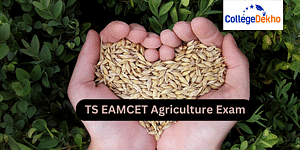BSc (Hons) Botany
BSc (Hons) Botany Overview
BSc (Hons) Botany is an undergraduate academic programme that provides students with a thorough understanding of Plant Biology, Ecology, Genetics, and related scientific principles. This specialised degree programme prepares students for careers in research, environmental science, agriculture, biotechnology, and other fields by focusing on the various aspects of botany, going beyond the scope of a general BSc degree. The BSc Hons Botany syllabus generally includes foundational courses in cell biology, plant systematics, genetics, plant anatomy, and ecology. Students study the complex world of plants, investigating their structure, functions, and interactions with the environment. Laboratory work, field studies, and hands-on projects have important sections that allow students to apply theoretical knowledge to practical scenarios and develop essential scientific skills.
To be eligible for the BSc Hons Botany course, a candidate must have completed their 10+2 or an equivalent from a recognised board in the Science stream with a minimum of 50% marks in Biology. BSc (Hons) Botany admission is based on both merit and marks scored in entrance exams. Some universities provide admission on the basis of merit while some conduct entrance exams for BSc Hons Botany admissions. Bachelor of Science Honours in Botany fees range between INR 10K to 2 LPA on an average for a duration of 3 years.
Following the course completion, graduates can pursue BSc Hons Botany jobs such as Botanist, Biological Technician, Conservationist, Ecologist, Environment Consultant, EthnoBotanist, Mycologist, Nursery Manager, Palaeobotanist, Plant Biochemist, Plant Explorer, Plant Pathologist, Plant Researcher, Taxonomist, Weed Scientist etc. BSc Hons Botany salaries range from INR 2.5 to 4.5 LPA for entry-level positions, INR 4.5 to 7 LPA for mid-level profiles, and INR 8 to 12 LPA for senior-level profiles.
BSc Hons Botany graduates can also pursue a variety of postgraduate and professional courses to further specialise or broaden their skill set. MSc in Botany or Plant Sciences, MSc in Environmental Science or Ecology, MSc in Agricultural Sciences or Agronomy, MSc in Horticulture, MSc in Microbiology, MSc BioInformatics, and other courses are common after BSc Hons Botany, and etc.
Table of Contents
- BSc (Hons) Botany Overview
- BSc Hons Botany Highlights
- Why Choose BSc (Hons) Botany?
- What is an Online BSc Hons Botany Degree?
- Difference between BSc Hons Botany and BSc Hons Zoology
- Types of BSc Hons Botany Courses
- BSc Hons Botany Eligibility Criteria
- BSc Hons Botany Entrance Exams
- List of Popular BSc Hons Botany Specialisations
- BSc Hons Botany Admission Process in India
- Direct BSc Hons Botany Admission Process Without Entrance Exam
- BSc Hons Botany Fees in India
- BSc Hons Botany Syllabus/Subjects
- Top BSc Hons Botany Colleges in India
- Career Options after BSc Hons Botany
- Courses After BSc Hons Botany
- FAQs about BSc Hons Botany
BSc Hons Botany Highlights
The following table lists the course highlights BSc Hons Botany degree:
| Particulars | Details |
|---|---|
| Course Full Form | Bachelor of Science Honours in Botany |
| Degree | Bachelors |
| Course Duration | 3 years |
| Type of Examination | Semester or Annual |
| Eligibility Criteria | 10+2 or equivalent education with minimum of 50% marks |
| Age Limit | 17 - 23 Years |
| Process of Admission | Merit Based and Entrance Exam |
| Course Fees (Average) | INR 10k - 2L |
| Course Salary (Average) | INR 2 L - 12 L |
| Recruiting Companies | ITC Agribusiness, Indian Council of Agricultural Research (ICAR), State, Agriculture Departments, Godrej Agrovet, National Institute of Plant, Genome Research (NIPGR), Indian Agricultural Research Institute (IARI), Mahyco (Maharashtra Hybrid Seeds Company), Forest Departments, Indian Institute of Science (IISc), National Agro Industries, Universities and colleges with strong botany departments, Council of Scientific and Industrial Research (CSIR) laboratories, Biocon, Serum Institute of India, Sun Pharma, Dr. Reddy's Laboratories, Greenpeace India, WWF-India (World Wide Fund for Nature), Centre for Science and Environment (CSE), The Energy and Resources Institute (TERI), Himalaya Drug Company, Dabur India, Patanjali Ayurved, Hamdard Laboratories, ITC Foods, Britannia Industries |
| Employment Areas | Botanical Survey Centers, Floriculture Sector, Seed and Nursery Companies, Testing Laboratories, Eco-botany, Cosmetic Companies, Research and Development, Seed Banks and Germplasm Repositories, Museums and Science Centers, Plant Genetics, Food and Herbal, Industry / Food Institutes, Pharmaceutical Companies, Botanical, Gardens and Arboretums, Environmental Management Units, Farm Management Organizations, Herbariums / Herbal Products Companies, National Parks, Laboratories / Medical Research Centres / Medical Laboratories, Food and Beverage Industry, Lumber and Paper Companies, Education and Academia, Pharmaceutical and Herbal, Medicine Companies, Environmental Consulting, Government Research Laboratories |
| Top Job Positions | Botanist, Biological Technician, Conservationist, Ecologist, Environment Consultant, EthnoBotanist, Farming Consultant, Florist, Forester, Forest Ranger, Geneticist, Horticulturist, Molecular Biologist, Mycologist, Nursery Manager, Palaeobotanist, Plant Biochemist, Plant Explorer, Plant Pathologist, Plant Researcher, Taxonomist, Weed Scientist etc. |
Why Choose BSc (Hons) Botany?
Botany is important for agricultural technology and growing high-yielding crops that can also resist pests, as well as inducing immunity in certain crops against some Fungi or bacteria to grow big and fast. Plants with far more medicinal properties than their original form are also being researched. Botany has a lot of potential in agriculture and the food industry as food demand rises.
Various Career Opportunities: BSc Hons in Botany degree can lead to a variety of career opportunities. Graduates can work in agriculture, horticulture, forestry, environmental science, plant biotechnology, and conservation, among other fields. Botany knowledge and skills can be applied in pharmaceuticals, food and beverage industries, and research institutions.
Environmental Conservation: Understanding plants is essential for conservation efforts. Botany courses frequently cover topics such as plant ecology, biodiversity, and conservation, preparing you to contribute to environmental protection.
Scientific Research: This course can give candidates a good foundation if they are interested in conducting research as botany is a scientific field. Candidates might be able to participate in laboratory work, field studies, and independent research projects.
Address global challenges: Botany has global relevance, and understanding plant life is critical for addressing global challenges such as climate change, food security, and biodiversity loss. A BSc Hons in Botany will provide you with knowledge that can be applied both locally and globally.
Agriculture Innovation: With the world facing food production and security challenges, knowledge of plant sciences is critical for improving agricultural practices. Botany graduates may help to develop new crop varieties, sustainable farming methods, and plant disease solutions.
Personal Development: Botany can help candidates improve critical thinking, analytical, and problem-solving skills. It also promotes a deeper understanding of the natural world, which aids personal development and provides a broader perspective on ecological and environmental issues.
Interdisciplinary Opportunities: Botany frequently intersects with other scientific disciplines like chemistry, physics, and genetics. This interdisciplinary nature can provide an overall education while also opening doors to a variety of career options.
What is an Online BSc Hons Botany Degree?
An online BSc Hons Botany degree is a bachelor's level academic programme that focuses on botany and is delivered via an online learning platform. This means that students can complete the majority or all of their coursework remotely by taking lectures, readings, assignments, and other course materials through the internet.
Flexibility: Online programmes are designed for candidates who may have work, family, or other obligations. This degree can be completed at any time, allowing students to make a schedule according to their needs.
Virtual Learning Environment: Virtual learning environments (VLEs) or learning management systems (LMSs) are used in online courses to allow students to access course materials, participate in discussions, submit assignments, and communicate with instructors and peers.
Interactive Elements: Many online programmes include interactive elements such as virtual labs, multimedia presentations, and discussion forums to encourage student engagement and collaboration.
Course Content: An online BSc (Hons) Botany degree will most likely cover a variety of topics in plant biology, ecology, taxonomy, genetics, and environmental science. The specific courses may differ depending on the programme, but they are all designed to provide a thorough understanding of plant life and related scientific principles.
Difference between BSc Hons Botany and BSc Hons Zoology
Following table describes the difference between BSc Hons Botany and BSc Hons Zoology:
| Parameters | BSc Hons Botany Course | BSc Hons Zoology Course |
|---|---|---|
| Level | Undergraduate | Undergraduate |
| Course Duration | 3 years | 3 years |
| Course Eligibility | All students must have passed their 10+2 in science stream with 50% marks in biology | All students must have passed their 10+2 in science stream with 50% marks in biology |
| Admission Process | Merit basis and Entrance exams (National and State level) | Merit basis and Entrance exams (National and State level) |
| Average Course Fees | INR 10K to 2 L | INR 5K to 2 L |
| Average Pay | INR 2 L to 12 LPA | INR 1.5 L to 10 LPA |
| Top Recruiting Companies | ITC Agribusiness, Indian Council of Agricultural Research (ICAR), State, Agriculture Departments, Godrej Agrovet, National Institute of Plant, Genome Research (NIPGR), Indian Agricultural Research Institute (IARI), Mahyco (Maharashtra Hybrid Seeds Company), Forest Departments, Indian Institute of Science (IISc) etc. | Wildlife Institute of India (WII), Bombay Natural History Society (BNHS), UPL Limited, Forest Departments, Zoological Survey of India (ZSI), Gharda Group, Indofil Industries, Bharat Group, Sharda Cropchem Limited, Willowood India, Meghmani Group, etc.
|
| Job Opportunities | Horticulturist, Medical Transcriptionists, Senior Territory Manager, Chief Human Resources Officer (CHRO), Botanist, Biological Technician, Ecologist, Senior Technical Officer, Forester, Environmental Consultant etc. | Animal Breeder, Animal Caretaker, Zoo Curator, Animal Behaviourist,Conservationist, Animal Trainer, Animal Physiologist, Animal Rehabilitator, , Animal and Wildlife Educator, Documentary Maker, Veterinarian, Forensic Expert, Researcher, Lab Technician, Wildlife Biologist, Zoo Keeper etc. |
Types of BSc Hons Botany Courses
BSc Hons Botany course can differ in their focus, structure, and emphasis on specific aspects of plant biology. The following are the main types of BSc Hons Botany courses:
- BSc Hons in Plant Biology
- BSc Hons in Plant Sciences
- BSc Hons in Medicinal Plant Sciences or Ethnobotany
- BSc Hons in Plant Biotechnology
- BSc Hons in Horticulture
- BSc Hons in Agricultural Botany
- BSc Hons in Forestry and Botany
- BSc Hons in Conservation Biology
BSc Hons Botany Eligibility Criteria
Aspiring candidates must go through the complete BSc (Hons) Botany eligibility criteria before applying for this course. The BSc Hons Botany eligibility criteria has been described below:
- Students interested in the BSc Non-Medical programme must have completed their 10+2 or equivalent from a recognised board in Science stream.
- They must have scored at least 50% marks in Biology.
- Some universities conduct entrance exams for the BSc Hons Botany programme. So, students must also pass the common entrance examination conducted by the specific university with good marks.
- The BSc Hons Botany course has a minimum age requirement of 17 years.
Skills Required for BSc Hons Botany
BSc Hons Botany programme generally requires a variety of skills in order to succeed in academic coursework, practical applications, and potential future careers. Here are some key skills required for BSc Hons Botany course:
- Scientific Inquiry
- Observation and Attention to Detail
- Laboratory Techniques
- Fieldwork Skills
- Communication Skills
- Teamwork and Collaboration
- Analytical Skills
- Problem-Solving
- Computer and Technology Proficiency
- Time Management
- Adaptability and Curiosity
- Ethical Conduct
BSc Hons Botany Entrance Exams
The entrance exams for BSc Hons Botany programmes differ depending on the university or college that offers the programme. Some universities in India hold entrance exams for their undergraduate botany programmes. Following is the BSc Hons Botany entrance exam:
- CUET
List of Popular BSc Hons Botany Specialisations
While most BSc Hons Botany programmes cover a wide range of plant biology topics, some universities offer specialisations or elective tracks that allow students to focus on specific areas of interest. Students can gain in-depth knowledge and skills in specific branches of botany through specialisation. Following is the list of popular BSc Hons Botany Specialisations:
- Genetics
- Cell Biology
- Microbiology
- Ecology
- Plant Biotechnology
- Plant anatomy
- Plant Physiology
- Anatomy
- Biochemistry
- Biotechnology
- Environmental conservation
- Microbial diversity
- Agriculture
- Bioinformatics
- Medicinal Plant Sciences or Ethnobotany
- Plant Ecology
- Plant Genetics and Breeding
- Agricultural Botany
- Forest Biology or Forestry and Botany
- Conservation Biology
- Algal Biology
- Paleobotany
- Seed Science and Technology
- Computer Education
- Economic Botany
- Environmental Management
- Forestry
- Horticulture
- Molecular Biology
- Mycology
- Phycology
- Plant Pathology
- Research Methods
- Stress Biology
BSc Hons Botany Admission Process in India
Students must meet the basic eligibility criteria before enrolling in BSc Hons Botany. Some universities provide BSc (Hons) Botany admissions based on merit. So, candidates must ensure that they have a strong performance in the 10+2 examinations for merit-based selection. On the other hand some universities conduct entrance exams for admission in this course. So, aspiring candidates must also score good marks in entrance exams to get admitted in the specific university. There are two options for admission to BSc Hons Botany. Applications for BSc Hons Botany admission can be obtained through college portals or by visiting the admission offices of the colleges.
Shortlisted candidates will be invited to group discussions and personal interviews held by colleges. The admit card and other examination information are posted on the college website ahead of time. Students would be able to view their results online on the official websites.
Candidates can follow the steps provided below for BSc (Hons) Botany admission through entrance exams:
- Register for the exam.
- Sit for the exam and score good marks
- Following the exam, students are summoned to a counselling session, during which their seats are assigned based on their overall performance.
- Students must pay the admission fee after receiving confirmation of seat availability, which is followed by a process of document verification.
Direct BSc Hons Botany Admission Process Without Entrance Exam
Direct BSc (Hons) Botany admission is entirely based on the students' class 12th results. Several colleges provide admission to BSc (Hons) Botany course without an entrance exam. To be admitted, candidates must only meet the basic eligibility criteria for the course at that college.
BSc Hons Botany Fees in India
BSc Hons Botany fees range between INR 10K and INR 2 LPA. Course fees for a BSc (Hons) Botany course in India can vary significantly depending on factors like university, location, and whether the institution is private or public.
BSc Hons Botany Syllabus/Subjects
The BSc (Hons) Botany syllabus focuses on Plant Anatomy, Biology, Classification, Structure, Denomination, and Description. BSc Hons Botany introduces students to a wide range of botanical concepts, with a particular focus on Molecular Biology, Cell Biology, and Genetics.
A BSc Hons Botany course syllabus or subjects might differ between universities, and the structure may change over time. The following is the year wise BSc Hons Botany syllabus:
BSc Hons Botany First Year Syllabus
The first year syllabus of BSc Hons Botany focuses on topics like English Communication/Environmental Science, Biomolecules & Cell Biology, Algae and Microbiology, Archegoniate, Mycology and Phytopathology.
Following table describes the first year BSc Hons Botany syllabus:
| Semester I | Semester II |
|---|---|
| English Communication/Environmental Science I | English Communications/Environmental Science II |
| Biomolecules and Cell Biology | Archegoniate |
| Biomolecules and Cell Biology (Practical) | Archegoniate(Practical) |
| Algae and Microbiology I | Mycology and Phytopathology |
| Algae and Microbiology II | Mycology and Phytopathology(Practical) |
| General Elective I | General Elective II |
| General elective I (Practical) | General Elective II (Practical) |
BSc Hons Botany Second Year Syllabus
The second year syllabus of BSc (Hons) Botany focuses on topics like Morphology and Anatomy, Molecular Biology, Economic Botany, Genetics, Plant Ecology and Phytogeography, Plant Systematics.
Following table describes the second year BSc Hons Botany syllabus:
| Semester III | Semester IV |
|---|---|
| Morphology and Anatomy | Molecular Biology |
| Morphology and Anatomy (Practical) | Molecular Biology (Practical) |
| Economic Botany | Plant Ecology and Phytogeography |
| Economic Botany (Practical) | Plant Ecology and Phytogeography (Practical) |
| Genetics | Plant Systematics |
| Genetics (Practical) | Plant Systematics (Practical) |
| Skill Enhancement Course I | Skill Enhancement Course II |
| General Elective III | General Elective IV |
| General Elective III (Practical) | General Elective IV (Practical) |
BSc Hons Botany Third Year Syllabus
The third year syllabus of BSc Hons Botany focuses on topics like Reproductive Biology of Angiosperms, Plant Metabolism, Plant Physiology, Plant Biotechnology.
Following table describes the third year BSc Hons Botany syllabus:
| Semester V | Semester VI |
|---|---|
| Reproductive Biology of Angiosperms | Plant Metabolism |
| Reproductive Biology of Angiosperms (Practical) | Plant Metabolism (Practical) |
| Plant Physiology | Plant Biotechnology |
| Plant Physiology (Practical) | Plant Biotechnology (Practical) |
| Discipline Specific Elective I | Discipline Specific Elective III |
| Discipline Specific Elective I (Practical) | Discipline Specific Elective III (Tutorial/Practical) |
| Discipline Specific Elective II | Discipline Specific Elective IV |
| Discipline Specific Elective II ( Tutorial/Practical) | Discipline Specific Elective IV (Tutorial/Practical) |
BSc Hons Botany Subjects
Listed below are the main BSc Hons Botany subjects:
Core Courses
- Molecular biology
- Algae and Microbiology
- Genetics
- Morphology and Anatomy
- Mushroom Culture Biotechnology
- Plant Diversity and Human Welfare
- Environmental Science
- Medicinal Botany
- Environmental Biology
- Plant Ecology and Taxonomy
- Economic Botany and Biotechnology
- Plant Anatomy and Embryology
Elective Courses
- Bioinformatics
- Stress Biology
- Discipline Specific
- Natural Resource Management
- Analytical Techniques in Plant Sciences
Top BSc Hons Botany Colleges in India
Following table shows the list of top BSc (Hons) Botany Colleges in India:
| College Name | City | Average Course Fees |
|---|---|---|
| Mount Carmel College | Bangalore | INR 60K |
| Christ University | Bangalore | INR 30K |
| Fergusson College | Pune | INR 33K |
| The Neotia University | Kolkata | INR 1.5 L |
| St Xavier’s College | Ahmedabad | INR 72K |
| St Joseph’s College | Calicut | INR 35K |
| Elphinstone College | Mumbai | INR 27K |
| Jai Hind College | Mumbai | INR 24K |
| National Post Graduate College | Lucknow | INR 20K |
| University of Lucknow | Lucknow | INR 36K |
| Jyoti Nivas College | Bangalore | INR 31K |
| Sacred Heart College | Ernakulam | INR 11.5K |
| Ranchi University | Ranchi | INR 11K |
Career Options after BSc Hons Botany
There are a variety of jobs available after completing a BSc Hons Botany in both government and private sector. Many governmental organisations employ BSc (Hons) Botany graduates for a variety of positions. Following are some of the common career options after BSc Hons Botany:
| Job Position | Job Description | Average Annual Salary |
|---|---|---|
| Horticulturist | Horticulturists are experts who study plants and trees and provide advice on the care and management of forests, gardens, and other landscapes. They supervise the planting and cultivation of flowers, trees, and plants. | INR 2.5 LPA |
| Medical Transcriptionists | Medical transcriptionists listen to a physician's or other healthcare worker's recorded dictation. They also Interpret and transcribe dictation for medical reports such as patient histories, physical examinations and discharge summaries. | INR 2.23 LPA |
| Senior Territory Manager | Senior territory manager maintains customer relationships in a geographical area by addressing their concerns and offering solutions. They also assist in increasing sales revenue and presenting products and services to new or existing clients. | INR 4 LPA |
| Chief Human Resources Officer (CHRO) | A chief human resources officer (CHRO) is a corporate officer who oversees the HR management and labour relations policies, practices, and operations of their organisation. This position is also known as the chief people officer (CPO) in some organisations. | INR 12 LPA |
| Botanist | A botanist is a plant scientist who studies flowering plants, moss, and seaweed at the microscopic and macroscopic levels. Botanists are also called plant biologists and phytologists. | INR 3.6 LPA |
| Biological Technician | A Biological Technician is responsible for empowering scientists in experiments dealing with living things including setting up and maintaining tools and equipment. | INR 5.5 LPA |
| Ecologist | Ecologists conduct field studies, research and are in charge of researching and collecting data on many different aspects of the natural world. This could include studying plant and animal populations, analysing their interactions, and researching the effects of human activity on ecosystems. | INR 2.75 LPA |
| Senior Technical Officer | The Senior Technical Officer provides critical expertise on technology-related activities undertaken to improve the ICO's understanding of current and emerging information, communications, and security technologies, as well as the impact they have or are likely to have on information rights. | INR 10 LPA |
| Forester | Foresters are in charge of forest management. They are typically involved in a variety of tasks such as timber harvesting, ecological restoration, and day-to-day management of secured areas. | INR 2.45 LPA |
| Environmental Consultant | Environmental Consultants are earth scientists who help develop, analyse, and enforce government policies to protect the environment from industrial hazards. | INR 6 LPA |
BSc Hons Botany Salary
BSc Hons Botany salary ranges from INR 2.5 - 4.5 LPA for entry-level positions, INR 4.5 - 7 LPA for mid-level profiles, and INR 8 - 12 LPA for senior-level profiles.
BSc Hons Botany Recruiters
Companies that hire BSc Hons Botany graduates may vary according to the profession of the candidate. Following is the list of top BSc Hons Botany recruiting companies in India:
| Top BSc Hons Botany Recruitment Companies | ||
|---|---|---|
| Amul | Nestlé India | Adani Environmental & Remediation Team |
| ITC Agribusiness | Indian Council of Agricultural Research (ICAR) | State Agriculture Departments |
| Godrej Agrovet | National Institute of Plant Genome Research (NIPGR) | Indian Agricultural Research Institute (IARI) |
| Mahyco (Maharashtra Hybrid Seeds Company) | Forest Departments | Indian Institute of Science (IISc) |
| National Agro Industries | Universities and colleges with strong botany departments | Council of Scientific and Industrial Research (CSIR) laboratories |
| Biocon | Serum Institute of India | Sun Pharma |
| Dr. Reddy's Laboratories | Greenpeace India | |
| WWF-India (World Wide Fund for Nature) | Centre for Science and Environment (CSE) | The Energy and Resources Institute (TERI) |
| Himalaya Drug Company | Dabur India | Patanjali Ayurved |
| Hamdard Laboratories | ITC Foods | Britannia Industries |
| Botanical Survey of India (BSI) | Foundation for Revitalisation of Local Health Traditions (FRLHT) | National Bureau of Plant Genetic Resources (NBPGR) |
| Indian Agricultural Statistics Research Institute (IASRI) | Indian Institute of Horticultural Research (IIHR) | Florance Flora |
BSc Hons Botany Employment Areas
BSc Hons in Botany graduates can get numerous job opportunities in a variety of fields. Following is the list of the main BSc Hons Botany employment areas:
| Agro-processing and Food Technology | Biotechnology Firms | Agricultural Research Services |
|---|---|---|
| Botanical Survey Centers | Floriculture Sector | Seed and Nursery Companies |
| Testing Laboratories | Eco-botany | Cosmetic Companies |
| Research and Development | Seed Banks and Germplasm Repositories | Museums and Science Centers |
| Plant Genetics | Food and Herbal Industry / Food Institutes | Pharmaceutical Companies |
| Botanical Gardens and Arboretums | Environmental Management Units | Farm Management Organizations |
| Herbariums / Herbal Products Companies | National Parks | Laboratories / Medical Research Centres / Medical Laboratories |
| Food and Beverage Industry | Lumber and Paper Companies | Education and Academia |
| Pharmaceutical and Herbal Medicine Companies | Environmental Consulting | Government Research Laboratories |
| Fermentation Industries (including Breweries) | Horticulture Companies | Horticulture and Floriculture |
| Environmental Organisations | Environmental Organisations | Government Agencies |
| Research Institutions | Agriculture and Agribusiness | Biotechnology and Pharmaceutical Industry |
Courses After BSc Hons Botany
BSc Hons Botany graduates can pursue a variety of postgraduate and professional courses to further specialise in a specific area or broaden their skill set. Here is the list of common courses after BSc Hons Botany:
- MSc in Botany or Plant Sciences
- MSc in Environmental Science or Ecology
- MSc in Agricultural Sciences or Agronomy
- MSc in Horticulture
- MSc in Microbiology
- MSc BioInformatics
- MSc in Life Science
- MSc in Biotechnology
- MSc in Environmental Management
- MBA in Agribusiness or Environmental Management
- MBA in Pharmaceutical Management
- PG Diploma in Environmental Law
- PG Diploma in Biotechnology
- PG Diploma in Clinical Research
- PG Diploma in Plant Tissue Culture
- PG Diploma in Industrial Microbiology
- Certification Courses in GIS (Geographic Information System)
- PhD in Botany
FAQs about BSc Hons Botany
What is BSc Honours Botany?
The BSc (Hons) Botany degree provides students with the necessary knowledge and technical skills to study plants holistically. Students would be trained in all aspects of plant biology through a combination of core and elective papers that consists of significant interdisciplinary components.
What jobs are available after completing a BSc in Botany?
BSc (Hons) Botany graduates can work as a plant explorer, horticulturist, conservationist, plant biochemist, ecologist, environmental consultant, molecular biologist, nursery manager, genetics, environmental consultant, taxonomist, plant pathologist and agricultural consultant etc.
What are the benefits of BSc Hons Botany?
Botany opens up many educational and career opportunities for students including microbiology, biotechnology, and even medical technology. Educational scopes include any and all plant-related aspects, such as agriculture engineering, horticulture, research, and so on.
Which one is easier between BSc Botany or Zoology?
Students consider zoology to be easier than botany because it generally combines animal biology with human biology. Plants, on the other hand, appear strange, and the terminology is unfamiliar, making it appear a little more difficult.
What is the highest paying job position in Botany?
Senior botanists and plant geneticists are the highest paid positions, with annual salaries ranging from INR 8.4 - 12 LPA and INR 7.5 LPA, respectively.
Can I pursue an MBA after Botany?
You can choose between a General MBA programme and a Specialised MBA programme. General MBA covers the fundamentals of management. It prepares students to enter the vast field of management. The specialised MBA program's curriculum consists of core management subjects along with few elective subjects.
What are the 5 main branches of Botany?
Following are the 5 branches of Botany:
- Plant Ecology
- Plant Pathology
- Palaeobotany
- Archaeobotany
- Forensic Botany
Can I join ISRO after completing a BSc in Botany?
Yes, you can work for the Indian Space Research Organisation (ISRO) as a Scientific Assistant, but not as a scientist. You can also work as a technician or assistant engineer.
Which is a better course, BSc botany or BSc biotechnology?
Biotechnology has applications in medical and veterinary sciences, chemical engineering, food and agriculture, and so on. Science, pollution and environmental protection, as well as waste management Botany is a good choice if you want to pursue a career in teaching and research.
Is maths required for a BSc Hons Botany programme?
No, Mathematics is not required for BSc Hons Botany programme, but Chemistry, Physics, and Biology are required.
- Courses
- BSc Hons Botany


















